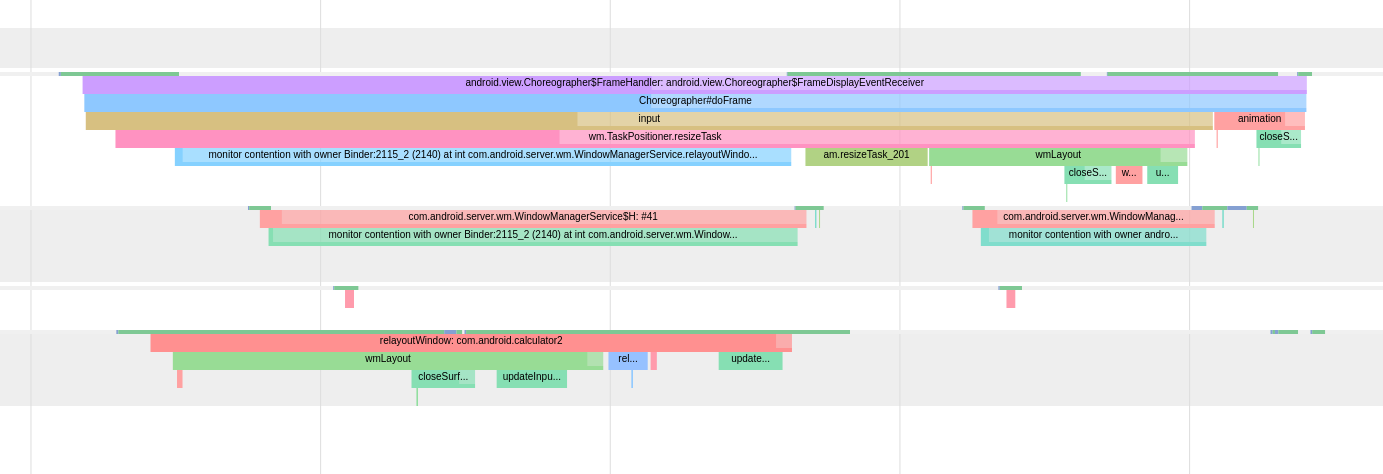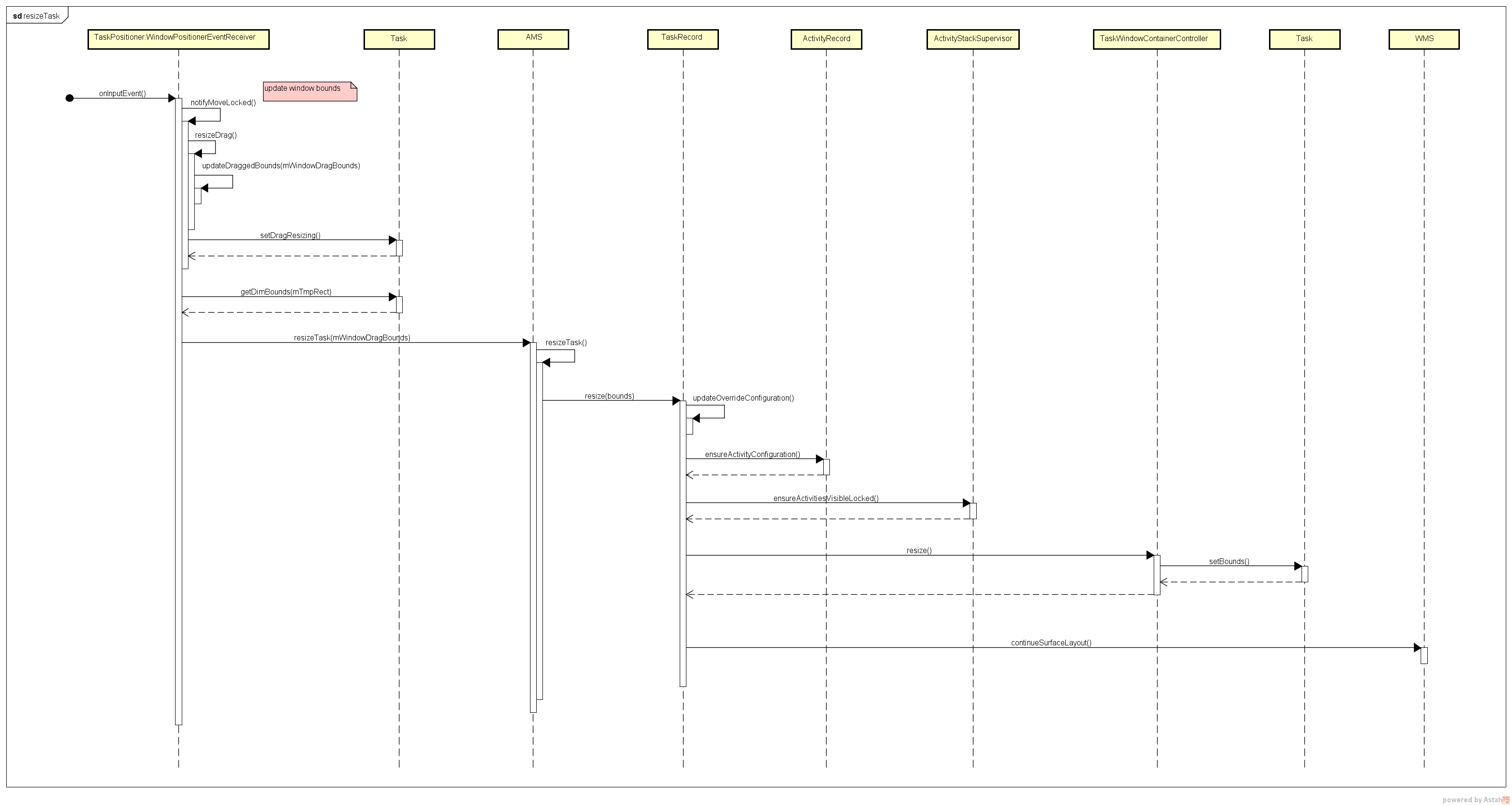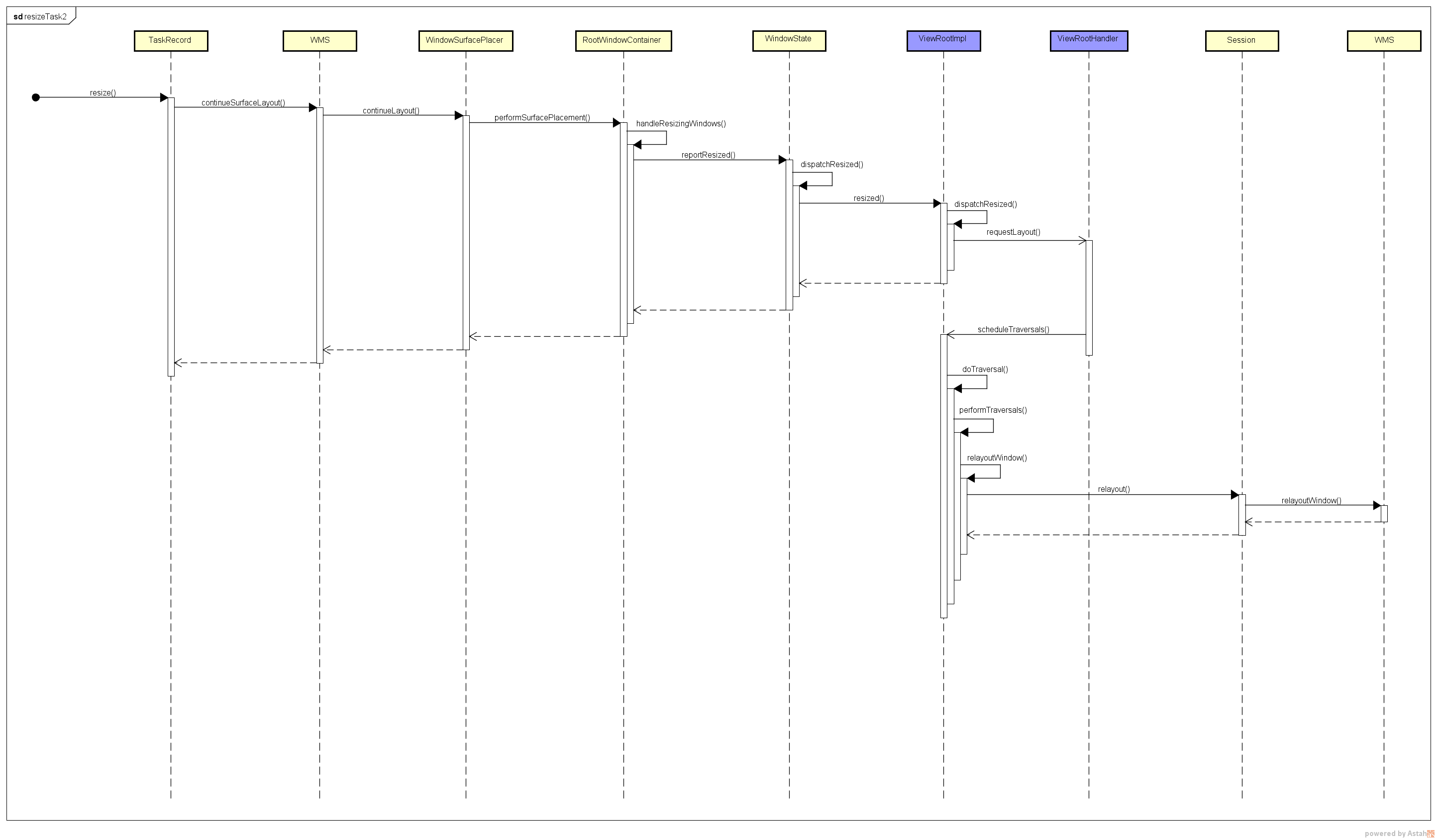Systrace

System

2020-09-01 17:06:56.991 2084-2169/system_process D/LXG: dispatchResized: reportDraw: true
java.lang.Throwable
at com.android.server.wm.WindowState.dispatchResized(WindowState.java:3109)
at com.android.server.wm.WindowState.reportResized(WindowState.java:3045)
at com.android.server.wm.RootWindowContainer.handleResizingWindows(RootWindowContainer.java:879)
at com.android.server.wm.RootWindowContainer.performSurfacePlacement(RootWindowContainer.java:675)
at com.android.server.wm.WindowSurfacePlacer.performSurfacePlacementLoop(WindowSurfacePlacer.java:207)
at com.android.server.wm.WindowSurfacePlacer.performSurfacePlacement(WindowSurfacePlacer.java:155)
at com.android.server.wm.WindowSurfacePlacer.performSurfacePlacement(WindowSurfacePlacer.java:145)
at com.android.server.wm.WindowSurfacePlacer.continueLayout(WindowSurfacePlacer.java:136)
at com.android.server.wm.WindowManagerService.continueSurfaceLayout(WindowManagerService.java:2895)
at com.android.server.am.TaskRecord.resize(TaskRecord.java:561)
at com.android.server.am.ActivityManagerService.resizeTask(ActivityManagerService.java:10995)
at com.android.server.wm.TaskPositioner$WindowPositionerEventReceiver.onInputEvent(TaskPositioner.java:174)
at android.view.InputEventReceiver.dispatchInputEvent(InputEventReceiver.java:187)
at android.view.InputEventReceiver.nativeConsumeBatchedInputEvents(Native Method)
at android.view.InputEventReceiver.consumeBatchedInputEvents(InputEventReceiver.java:178)
at android.view.BatchedInputEventReceiver.doConsumeBatchedInput(BatchedInputEventReceiver.java:49)
at android.view.BatchedInputEventReceiver$BatchedInputRunnable.run(BatchedInputEventReceiver.java:78)
at android.view.Choreographer$CallbackRecord.run(Choreographer.java:1012)
at android.view.Choreographer.doCallbacks(Choreographer.java:823)
at android.view.Choreographer.doFrame(Choreographer.java:752)
at android.view.Choreographer$FrameDisplayEventReceiver.run(Choreographer.java:998)
at android.os.Handler.handleCallback(Handler.java:873)
at android.os.Handler.dispatchMessage(Handler.java:99)
at android.os.Looper.loop(Looper.java:193)
at android.os.HandlerThread.run(HandlerThread.java:65)
at com.android.server.ServiceThread.run(ServiceThread.java:44)
APP

代码
AMS
@Override
public void resizeTask(int taskId, Rect bounds, int resizeMode) {
-------------------------------------------------------------------------
TaskRecord task = mStackSupervisor.anyTaskForIdLocked(taskId);
------------------------------------------------------------------------------------
// After reparenting (which only resizes the task to the stack bounds), resize the
// task to the actual bounds provided
task.resize(bounds, resizeMode, preserveWindow, !DEFER_RESUME);
}
TaskRecord
boolean resize(Rect bounds, int resizeMode, boolean preserveWindow, boolean deferResume) {
mService.mWindowManager.deferSurfaceLayout(); // 开始推迟布局传递, 在进行多项更改时很有用,但为了优化性能,仅应执行一次布局遍历
try {
---------------------------------------------------------------------------------------
// Do not move the task to another stack here.
// This method assumes that the task is already placed in the right stack.
// we do not mess with that decision and we only do the resize!
Trace.traceBegin(TRACE_TAG_ACTIVITY_MANAGER, "am.resizeTask_" + taskId);
final boolean updatedConfig = updateOverrideConfiguration(bounds); // 处理configChange
// This variable holds information whether the configuration didn't change in a significant
// way and the activity was kept the way it was. If it's false, it means the activity
// had to be relaunched due to configuration change.
boolean kept = true;
if (updatedConfig) {
final ActivityRecord r = topRunningActivityLocked();
if (r != null && !deferResume) {
kept = r.ensureActivityConfiguration(0 /* globalChanges */,
preserveWindow);
mService.mStackSupervisor.ensureActivitiesVisibleLocked(r, 0,
!PRESERVE_WINDOWS);
if (!kept) {
mService.mStackSupervisor.resumeFocusedStackTopActivityLocked();
}
}
}
mWindowContainerController.resize(kept, forced);
Trace.traceEnd(TRACE_TAG_ACTIVITY_MANAGER);
return kept;
} finally {
mService.mWindowManager.continueSurfaceLayout(); // Resumes layout passes after deferring them. See {@link #deferSurfaceLayout()}
}
}
ActivityRecord
/**
* Make sure the given activity matches the current configuration. Ensures the HistoryRecord
* is updated with the correct configuration and all other bookkeeping is handled.
*
* @param globalChanges The changes to the global configuration.
* @param preserveWindow If the activity window should be preserved on screen if the activity
* is relaunched.
* @param ignoreStopState If we should try to relaunch the activity even if it is in the stopped
* state. This is useful for the case where we know the activity will be
* visible soon and we want to ensure its configuration before we make it
* visible.
* @return True if the activity was relaunched and false if it wasn't relaunched because we
* can't or the app handles the specific configuration that is changing.
*/
boolean ensureActivityConfiguration(int globalChanges, boolean preserveWindow,
boolean ignoreStopState) {
--------------------------------------------------------------------------
if (DEBUG_SWITCH || DEBUG_CONFIGURATION) Slog.v(TAG_CONFIGURATION,
"Ensuring correct configuration: " + this);
--------------------------------------------------------------------------
// TODO(b/36505427): Is there a better place to do this?
updateOverrideConfiguration();
// Short circuit: if the two full configurations are equal (the common case), then there is
// nothing to do. We test the full configuration instead of the global and merged override
// configurations because there are cases (like moving a task to the pinned stack) where
// the combine configurations are equal, but would otherwise differ in the override config
mTmpConfig.setTo(mLastReportedConfiguration.getMergedConfiguration());
if (getConfiguration().equals(mTmpConfig) && !forceNewConfig && !displayChanged) {
if (DEBUG_SWITCH || DEBUG_CONFIGURATION) Slog.v(TAG_CONFIGURATION,
"Configuration & display unchanged in " + this);
return true;
}
// Okay we now are going to make this activity have the new config.
// But then we need to figure out how it needs to deal with that.
// Find changes between last reported merged configuration and the current one. This is used
// to decide whether to relaunch an activity or just report a configuration change.
final int changes = getConfigurationChanges(mTmpConfig);
// Update last reported values.
final Configuration newMergedOverrideConfig = getMergedOverrideConfiguration();
setLastReportedConfiguration(service.getGlobalConfiguration(), newMergedOverrideConfig);
----------------------------------------------------------------------------------
if (changes == 0 && !forceNewConfig) {
if (DEBUG_SWITCH || DEBUG_CONFIGURATION) Slog.v(TAG_CONFIGURATION,
"Configuration no differences in " + this);
// There are no significant differences, so we won't relaunch but should still deliver
// the new configuration to the client process.
if (displayChanged) {
scheduleActivityMovedToDisplay(newDisplayId, newMergedOverrideConfig);
} else {
scheduleConfigurationChanged(newMergedOverrideConfig);
}
return true;
}
if (DEBUG_SWITCH || DEBUG_CONFIGURATION) Slog.v(TAG_CONFIGURATION,
"Configuration changes for " + this + ", allChanges="
+ Configuration.configurationDiffToString(changes));
--------------------------------------------------------------------------------
// Figure out how to handle the changes between the configurations.
if (DEBUG_SWITCH || DEBUG_CONFIGURATION) Slog.v(TAG_CONFIGURATION,
"Checking to restart " + info.name + ": changed=0x"
+ Integer.toHexString(changes) + ", handles=0x"
+ Integer.toHexString(info.getRealConfigChanged())
+ ", mLastReportedConfiguration=" + mLastReportedConfiguration);
if (shouldRelaunchLocked(changes, mTmpConfig) || forceNewConfig) {
// Aha, the activity isn't handling the change, so DIE DIE DIE.
configChangeFlags |= changes;
startFreezingScreenLocked(app, globalChanges);
forceNewConfig = false;
preserveWindow &= isResizeOnlyChange(changes);
if (app == null || app.thread == null) {
------------------------------------------------------------------------
} else if (mState == PAUSING) {
-------------------------------------------------------------------------
} else if (mState == RESUMED) {
// Try to optimize this case: the configuration is changing and we need to restart
// the top, resumed activity. Instead of doing the normal handshaking, just say
// "restart!".
if (DEBUG_SWITCH || DEBUG_CONFIGURATION) Slog.v(TAG_CONFIGURATION,
"Config is relaunching resumed " + this);
if (DEBUG_STATES && !visible) {
Slog.v(TAG_STATES, "Config is relaunching resumed invisible activity " + this
+ " called by " + Debug.getCallers(4));
}
relaunchActivityLocked(true /* andResume */, preserveWindow);
} else {
if (DEBUG_SWITCH || DEBUG_CONFIGURATION) Slog.v(TAG_CONFIGURATION,
"Config is relaunching non-resumed " + this);
relaunchActivityLocked(false /* andResume */, preserveWindow);
}
// All done... tell the caller we weren't able to keep this activity around.
return false;
}
----------------------------------------------------------------------------------
return true;
}
0
次点赞